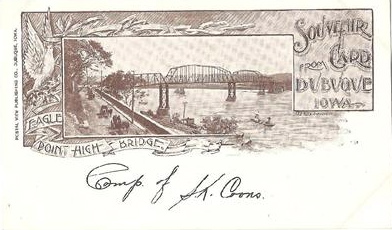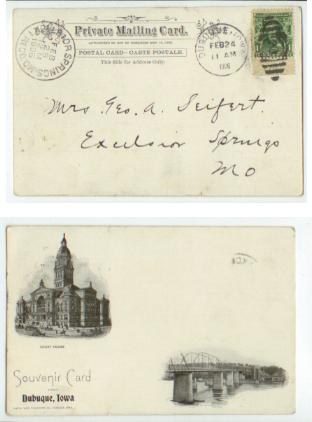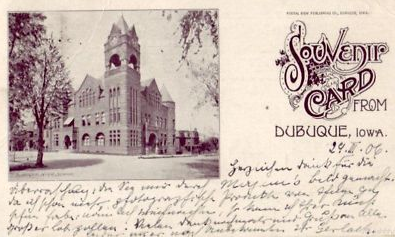Encyclopedia Dubuque
"Encyclopedia Dubuque is the online authority for all things Dubuque, written by the people who know the city best.”
Marshall Cohen—researcher and producer, CNN
Affiliated with the Local History Network of the State Historical Society of Iowa, and the Iowa Museum Association.
PRIVATE MAILING CARD: Difference between revisions
No edit summary |
No edit summary |
||
| (5 intermediate revisions by the same user not shown) | |||
| Line 1: | Line 1: | ||
[[Image:pmc.jpg|left|thumb|350px|Early form of correspondence.]]PRIVATE MAILING CARD. | [[Image:pmc.jpg|left|thumb|350px|Early form of correspondence.]]PRIVATE MAILING CARD. Following the [[CIVIL WAR]], Americans wanted an easy method of send quick notes. Responding to the need, the United States Postal Service began providing pre-stamped postal cards in 1873. The USPS was the only establishment allowed to print postcards and it held its monopoly until May 19, 1898. | ||
[[Image:MAILINGCARD.jpg|left|thumb| | In that year, Congress passed the Private Mailing Card Act which allowed private publishers and printers to produce postcards. The public could mail the private mailing cards for one cent instead of the letter rate of 2 cents. The term "private mailing card" came into use because the USPS wanted to keep the postcards it produced distinguishable from those being produced privately. The words "Private Mailing Card" were printed on the back of cards along with the statement "Authorized by Act of Congress of May 19, 1898" and "This side is exclusively for the Address" indicating that messages could be only be written on the front. | ||
During the Private Mailing Card era, messages were not allowed on the back of the cards; a small space was left on the front, for notes from the sender. The sender had to purchase a stamp for the Private Mailing Card. Also found on many of them was "Postal Card - Carte Postale" which indicated it was allowed to enter the international mail system. | |||
In December 1901, the United States Post Office issued Post Office Order No. 1447 which allowed the words "Post Card" instead of the longer Postal Mailing Card. Messages were still not allowed on the back of cards. Messages were first allowed on the back of the post card after March 1, 1907. | |||
--- | |||
Source: | |||
"A Post Card History of the Smithsonian Institution," Online: http://siarchives.si.edu/history/exhibits/postcard/chronology.htm | |||
[[Image:MAILINGCARD.jpg|left|thumb|250px|]] | |||
[[Image:pmc-1.png|right|thumb|250px|]] | |||
[[Category: Postcards]] | [[Category: Postcards]] | ||
Latest revision as of 01:23, 18 September 2017
PRIVATE MAILING CARD. Following the CIVIL WAR, Americans wanted an easy method of send quick notes. Responding to the need, the United States Postal Service began providing pre-stamped postal cards in 1873. The USPS was the only establishment allowed to print postcards and it held its monopoly until May 19, 1898.
In that year, Congress passed the Private Mailing Card Act which allowed private publishers and printers to produce postcards. The public could mail the private mailing cards for one cent instead of the letter rate of 2 cents. The term "private mailing card" came into use because the USPS wanted to keep the postcards it produced distinguishable from those being produced privately. The words "Private Mailing Card" were printed on the back of cards along with the statement "Authorized by Act of Congress of May 19, 1898" and "This side is exclusively for the Address" indicating that messages could be only be written on the front.
During the Private Mailing Card era, messages were not allowed on the back of the cards; a small space was left on the front, for notes from the sender. The sender had to purchase a stamp for the Private Mailing Card. Also found on many of them was "Postal Card - Carte Postale" which indicated it was allowed to enter the international mail system.
In December 1901, the United States Post Office issued Post Office Order No. 1447 which allowed the words "Post Card" instead of the longer Postal Mailing Card. Messages were still not allowed on the back of cards. Messages were first allowed on the back of the post card after March 1, 1907.
---
Source:
"A Post Card History of the Smithsonian Institution," Online: http://siarchives.si.edu/history/exhibits/postcard/chronology.htm




